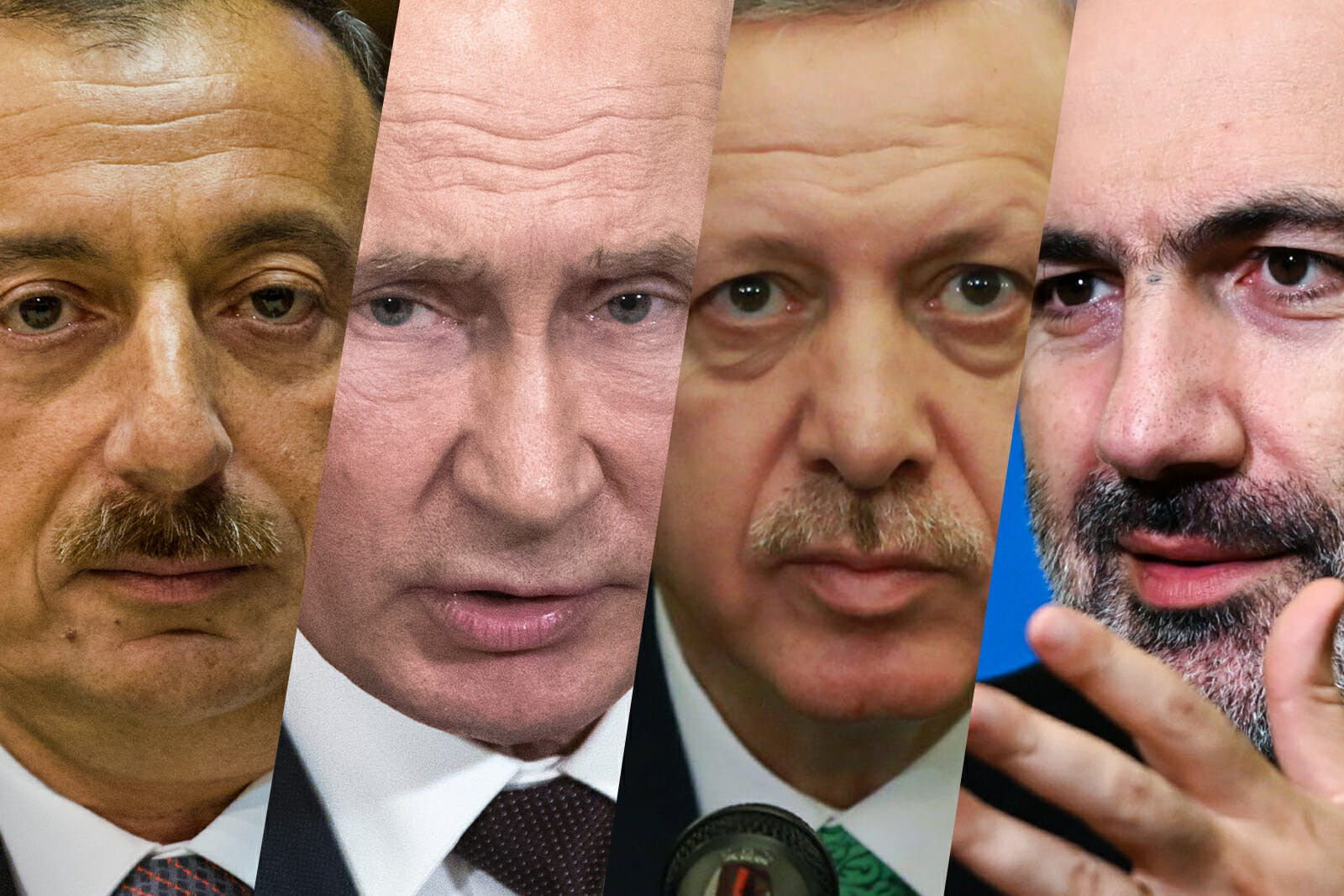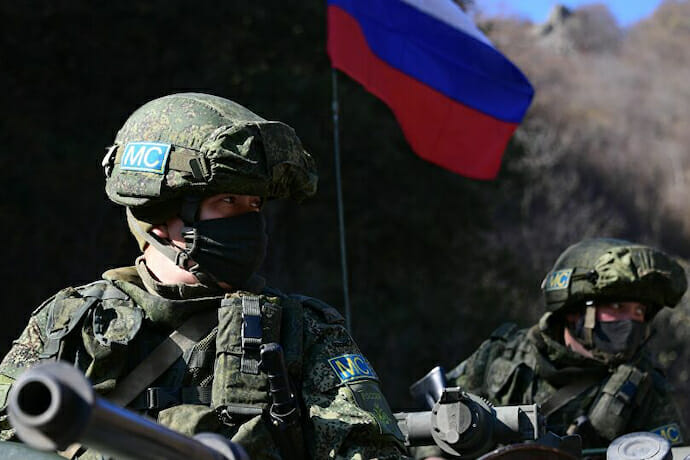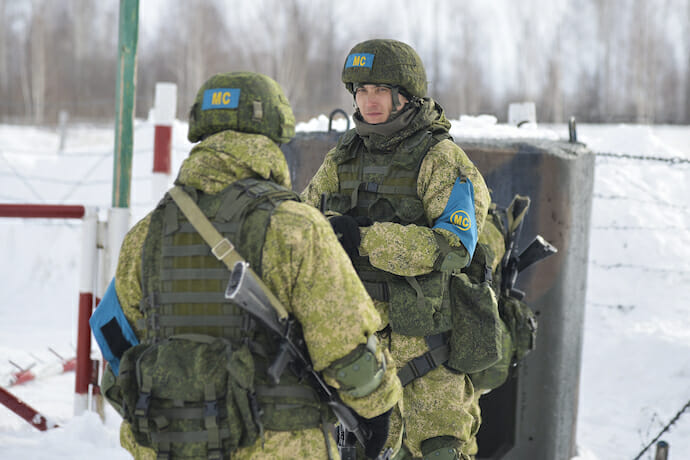
Armenia and Azerbaijan, and Russia’s Return to the Caucasus
On November 9th, Russian President Vladimir Putin announced that Armenia and Azerbaijan had halted 44 days of fighting that started on September 27th when Azerbaijan’s military forces attacked Armenian units that have occupied Azerbaijan’s majority-Armenian Nagorno-Karabakh enclave since 1992. The action was in response to Armenian attacks on Azerbaijan’s Tovuz district in the northwest of the country in June.
The ceasefire will see the introduction of up to 2,000 Russian peacekeeping troops on a renewable five-year mission. The troops will patrol the Nagorno-Karabakh line of contact and the Lachin Corridor that links the enclave’s capital, Stepanakert, to Armenia.
The deal is a victory for Putin. Though Russia has a defense pact with Armenia (and supplies weapons to both Armenia and Azerbaijan) it refused to be drawn into a conflict with Azerbaijan’s ally and NATO member Turkey over land that is not part of Armenia proper. And Putin dodged a possible second proxy war loss to Turkey in one year, the first being in Libya. Not even the last-minute shootdown of a Russian Mi-24 helicopter over Armenia, for which Azerbaijan apologized, would derail his program.
Azerbaijan’s push to retake Nagorno-Karabakh (known as the Nagorno-Karabakh Republic, or Artsakh to the Armenians) benefitted from Baku’s investment in modernizing its military, though there are reports of the presence of Turkish military advisors and 2,000 Syrian fighters. Updated weaponry like the Turkish Bayraktar TB2 drone, which can deliver anti-tank missiles and smart bombs, and Israeli “loitering munitions,” reportedly destroyed a variety of short, medium, and long-range air defense systems; six or seven artillery battalions; and over 500 Armenian military vehicles, demonstrating that a small country can integrate ground forces and drones for decisive effect without the cost of a modern air force.
The success of drones in Nagorno-Karabakh comes shortly after the Trump administration reinterpreted the Missile Technology Control Regime to encourage drone sales by no longer subjecting them to the export controls that apply to cruise missiles. This coincidence of a policy change and a practical demonstration will increase sales to mid-sized countries, largely to the benefit of China, Turkey, and Israel.

The Turkish-supplied drones got most of the attention, but Azerbaijan displayed effective mechanized infantry tactics, using its newly-acquired 152mm DANA howitzers, Rm-70 multiple rocket launchers, and LORA ballistic missiles in its push into the mountainous terrain around the strategic city of Shusha, the loss of which likely motivated Armenia to begrudgingly agree to Russia’s deal.
However this duel ends, Turkish Aerospace Industries and Bayraktar Makina, the developer of the TB2 drone, will also be winners as customers will want to buy the proven gear for the same reason automakers sponsor racing teams: “Win on Sunday, sell on Monday.”
Who are the other winners, and the losers?
First, Azerbaijan’s president, Ilham Aliyev, can now unify his country and claim to be completing the project started by Heydar Aliyev, his father, and predecessor. Aliyev also showed tactical flexibility as he talked tough but also publicly proposed four goals, preparing the Azeri public for a negotiated settlement instead of dramatic “fighting to the end.”
Also, Vladimir Putin, who checked Turkish influence in the Caucasus, a region he considers in Russia’s sphere of influence, now has troops close to the Iranian border which can collect intelligence and serve as insurance against Tehran. (Russia also has military bases in Armenia and Georgia’s breakaway provinces of Abkhazia and South Ossetia.)
Putin called on Aliyev to protect Christian sites in Nagorno-Karabakh and will claim he defended the interests of Armenia’s Christians by stopping the violence when the West did nothing. Russia may also recoup ground within Orthodoxy that was lost when Ukraine’s Orthodox church pulled away from the Moscow Patriarchate in 2018. Georgia’s leaders will likely take note.
Turkey’s president, Recep Tayyip Erdoğan, benefitted even though he wasn’t part of the ceasefire deal as he gave full-throated political support and military hardware – for which Baku likely paid full price – to Azerbaijan. Erdoğan hopes to be seen in the Caucasus and Central Asia, areas inhabited by Turkic peoples, as their defender. Turkey plans to have a presence in the ceasefire monitoring center.
Erdoğan has one more job: he has to get rid of however many Syrian Sunni fighters Turkey reportedly brought to the conflict zone. The fighters were useful as the most experienced of them fought the Assad regime, Hezbollah, the Iranian Revolutionary Guards, the Russians, Iraqi Shia militias at the Syria-Iraq border, the Kurds, and any members of Arab coalitions such as Jordan, the UAE, and Saudi Arabia. A bonus is their losses won’t be reported by Ankara or Baku, ensuring a low official casualty count (which is why you hire contractors), but the arrival of the Russian peacekeepers means they must be evacuated soon, especially due to their proximity to Iran’s border.
Who lost?
First, Armenia and especially Prime Minister Nikol Pashinyan who, two years ago, declared “Artsakh [the Armenian name for Nagorno-Karabakh] is Armenia, and that’s it.” Pashinyan failed to prepare the Armenian public for a negotiated settlement and after the announcement of the ceasefire, mobs in Yerevan sacked government offices and his official residence. In 2018, Pashinyan mobilized protests that led to the departure of his predecessor. Will his reformist administration survive or will he be replaced by a harder-liner?
Then, Iran, which has a legitimate interest in resolving the conflict as it borders both countries and suffered misguided shelling and airspace violations by the belligerents and concerns about the potential for restiveness in its large ethnic Azeri population (approximately 20 million). It wasn’t part of the deal Putin brokered and now has Russian troops near its border, rekindling memories of 1828 when Qajar Iran ceded modern-day Armenia, Azerbaijan, and part of eastern Turkey to the Russian Empire.

Lastly, the Organization for Security and Co-operation in Europe (OSCE) Minsk Group, which in 1992 was charged shepherding Azerbaijan and Armenia to a settlement over Nagorno-Karabakh, couldn’t deliver. It may get a supporting role in administering some follow-on events but Putin will have a practical veto on its actions.
Two of the Minsk Group’s co-chairs, France and the United States (Russia is the third), will soon meet with Moscow though they will have to establish trust with Baku as U.S. law favors Armenia and France has been described by Aliyev’s political advisor, Hikmet Hajiyev, “more Armenian than the Armenians themselves.”
Now that Russia has the initiative it will move quickly to get results before the new Biden administration takes office on 20 January 2021. American celebrities, Armenian-American advocacy groups, and some congressmen are calling for the suspension of aid to Azerbaijan, sanctions on Turkey and Azerbaijan, and aid for Armenia. But since this was a sovereignty issue for Baku, and an opportunity for expanded influence for Ankara, American sanctions were likely baked into the calculation.
If a Joe Biden administration re-enters the Iran nuclear deal, the Joint Comprehensive Plan of Action (JCPOA), that will ease pressure on Tehran but Iran may find its opportunities to push into the Caucasus checked by Russia and Turkey, so it will flow East to Afghanistan, West into the Persian Gulf, and will continue its operations in Iraq and Lebanon. Turkey and Russia will compete for interest in Central Asia, a region ethnically Turkic but where Russian is widely spoken and that was once part of the Russian Empire and the Soviet Union.
Russia may seek other opportunities for peacekeeping missions. Its model may be the Multinational Force & Observers (MFO) in the Sinai Peninsula that monitors the peace agreement between Egypt and Israel. The MFO was created outside the United Nations structure, ironically to avoid a veto by the Soviet Union in the UN Security Council. Peacekeeping operations outside the UN may be a low-impact way to extend Moscow’s writ without hazarding an American veto in the UNSC, especially if a Biden administration adopts an aggressive stance toward Russia.
Quelling conflict in the South Caucasus is important to Moscow as it is uncomfortably close to Chechnya and Dagestan in Russia’s North Caucasus where Russia has fought Muslim insurgents. And it makes sense for Putin as his approval rating, 59%, is a historic low as the afterglow from the 2014 annexation of Crimea has faded and pandemic response is uppermost in voters’ minds. The trick will be to not overstay his welcome and remind Russian voters about the war in Chechnya.
A negotiated settlement will give Armenia an opportunity to join the regional economy in which all the major infrastructure has – literally – bypassed the country: the oil and natural gas pipelines that supply Europe; the Transit Europe-Asia terrestrial (fiber optic) cable; the Baku-Tbilisi-Kars railway that connects Azerbaijan to Turkey; the M2 motorway that connects Azerbaijan and Georgia; the Port of Baku and the Alat Free Trade Zone; and the Lapis Lazuli corridor, a multi-modal trade route that runs from Afghanistan to Turkey.
The timing is good for energy security as the Southern Gas Corridor (SGC), which will send Azeri natural gas from the Shah Deniz field in the Caspian Sea to Europe and Turkey, is ready to commence operations. Normally the SGC could be expected to compete with Gazprom’s TurkStream gas line but if the Biden administration doesn’t support U.S. liquid natural gas exports to Europe competitive pressures on TurkStream will be eased.
In 2018, Azerbaijan suspended the oil and gas trade with Iran to comply with U.S. sanctions. If Biden eases sanctions on Iran to buy his way back into the JCPOA, Azerbaijan will be ready to sell to Iran, despite Baku’s support for Israel’s position on Jerusalem and Israel’s weapons sales to Azerbaijan. The two countries have had a lengthy relationship and, despite the recent policy splits, Iran has no interest in a conflict on its northern border to go along with all its other problems. And if Azerbaijan has to deal with Iran, it may have a slight edge when Iran is still weakened from sanctions, corruption, economic mismanagement, and COVID-19.
Biden may follow up on his commitment to recognize the 1915 Armenian genocide – normally a big boost to Yerevan, but now likely too late to matter. Biden may limit U.S. relations with Azerbaijan on the advice of his former Senate colleague, John Kerry, the chief proponent of Section 907 of the Freedom Support Act that prohibits direct U.S. aid to Azerbaijan unless the president waives the act for a limited period.
If there’s one thing that angers the Azeris it’s Section 907, but the impressive performance of the Turkish and Israeli weapons on the battlefield may show the limits of the U.S. law. Baku likely decided that U.S. security assistance ($100 million in 2018-2019) was less important than the country’s territorial integrity.
The contribution of Turkey, the “drone superpower,” is a consequence of a U.S. law that forced the 1975-1978 U.S. arms embargo of Turkey in response to Turkey’s 1974 intervention in Cyprus, and which spurred Turkey to develop its own arms industry to avoid dependence on foreign suppliers. Now Turkey will be ready to supply middle-income countries with proven equipment with few strings attached, unlike suppliers from Europe or North America. Turkey’s challenge is to construct a financing mechanism as its weak economy can’t support sales at concessional prices.
Azerbaijan should keep reminding Europe the name of the game is energy security and the peaceful Caucasus is key to ensuring the continent enjoys secure energy options. Azerbaijan can team with Georgia and the Central Asian states to balance against big powers with big plans and highlight the risk the region can become a chokepoint if one player can secure a veto on free transit or participation by others, or exclusive control of vital infrastructure. A template may be Baku’s attitude to Chinese investment: welcome but within limits.
Azerbaijan’s relationship with the U.S. will be limited by Section 907 and the attitude of the influential Armenian-American community if it takes a rejectionist line on any Russian-brokered deal. A wise course would be to look to America for business relationships but seek political and security services elsewhere.
Armenia suffered from leadership failure as uncompromising rhetoric wasn’t accompanied by a counter-proposal to Aliyev or public interest in discussing the Basic Principles for the settlement of the Nagorno-Karabakh conflict. Violent public reactions may limit the government’s negotiating room, further isolating Yerevan and increasing Baku’s leverage.
In the meantime, Russia is likely seeking Prime Minister Pashinyan’s replacement.
So, is Russia back in the Caucasus? Yes, for a while at least, and it has to share the space with Turkey, but it can provide incumbent leaders with political and security services that don’t require them to vote themselves out of power. It can’t stay forever but if it carefully manages its tenure it can extend its mandate beyond 2025.

